

Vol. 40 (Issue 42) Year 2019. Page 22
NADTOCHIY, Yuliya B. 1
Received: 20/08/2019 • Approved: 22/11/2019 • Published 09/12/2019
ABSTRACT: In today's world, the value, competitiveness of an organization is determined by a key factor such as intellectual capital, i.e. knowledge that is valuable for its own sake and therefore has a certain value; capitalized knowledge. Intellectual capital of an organization includes all knowledge of the employees of the organization, and therefore consists of intellectual capitals of different people. It does not simply unite such capitals, but implies the synergy of all intellectual resources to extract value. The article discusses different definitions of the concept of intellectual capital formulated by domestic and foreign researchers and presents the student survey results in order to find out the students’ opinions on intellectual capital and evaluation thereof. |
RESUMEN: En el mundo actual, el valor, la competitividad de una organización está determinada por un factor clave como el capital intelectual, es decir, el conocimiento que es valioso por sí mismo y, por lo tanto, tiene un cierto valor; conocimiento capitalizado. El capital intelectual de una organización incluye todo el conocimiento de los empleados de la organización y, por lo tanto, consiste en capitales intelectuales de diferentes personas. No solo une tales capitales, sino que implica la sinergia de todos los recursos intelectuales para extraer valor. El artículo analiza diferentes definiciones del concepto de capital intelectual formulado por investigadores nacionales y extranjeros y presenta los resultados de la encuesta a los estudiantes para conocer las opiniones de los estudiantes sobre el capital intelectual y su evaluación. |
At the moment, the concept of intellectual capital has many different interpretations. However, there is no single correct interpretation.
Almost all definitions of intellectual capital recognize that intellectual capital is knowledge (some intangible asset) and its value (Table 1).
Table 1
Definitions of the essence of the concept and structure
of intellectual capital in national and foreign studies
Foreign studies |
National studies |
Intellectual capital is the roots of the hidden conditions of development that lie behind the visible façade of its buildings and range of goods. [Edvinsson, Malone, 1999, p. 434]. |
Intellectual capital of an entity is the value of the total intellectual assets it has, including intellectual property, its natural and acquired intellectual abilities and skills, as well as the knowledge bases accumulated by it and useful relations with other entities [Leontiev, 2002, p. 101]. |
Intellectual capital is a term for intangible assets without which the company cannot exist in the modern world [Brooking, 2001, p. 30]. |
|
Intellectual capital (knowledge) is anything valued by the organisation that is embedded in people or derived from processes, systems, and the organisational culture [Bukowitz, Williams, 2002, p. 3]. |
Human intellectual capital is an interlinked relationship between human intellect and its intellectual developments that have practical applications [Loseva, 2010, p. 271]. |
Intellectual capital consists of the stocks and flows of knowledge, ability, skill and competencies available to an organisation. [Armstrong, 2004, p. 64]. |
Intellectual capital (individual intellectual capital or personal intellectual capital) is a type of capital, including a social subject’s intelligence (of a human being, group of people, organisation, society) and products of its activities i.e. new information and knowledge, those that are of social and economic value and providing it with an income (benefit) and competitive advantages [Dresvyannikov, Loseva, 2017, p. 8]. |
Intellectual capital — total knowledge of a company’s personnel who make the company competitive. This is intellectual material — knowledge, information intellectual property experience — that can be put to use to create wealth [Stewart, 2007, p. 11-12]. |
According to the data presented in Table 1, it can be concluded that in foreign studies intellectual capital is considered mainly in relation to the entire organization (intellectual capital of the organization), and in domestic studies there are studies in which the intellectual capital of an individual (employee) is studied.
In order to derive our own definition of the concept of intellectual capital, the definitions such as ‘intellect’, ‘intellectual’ and ‘capital’ were studied in detail separately (Nadtochiy, 2017).
If we try to literally interpret the concept of intellectual capital, we can say highly conditionally that it is wealth of mind (wealth of reason).
Reason (mind) is the highest form of theoretical mastering of reality, manifested in the human ability to think (Source: Gamezo M.V., Domashenko I.A. Atlas on Psychology: Information and Methodological Guide to Human Psychology Course. Moscow: Pedagogical Society of Russia, 1999. P. 173).
Let us take, for example, some of the meanings of the word capital. Capital is [Dictionary of Economics, 2017, p. 266]:
Thus, all the above meanings of the word capital can be naturally considered in combination with the word intellectual as well subject its specificity.
For example: intellectual capital is:
Economically speaking, intellectual capital is a special kind of capital because it provides an economic benefit to a person in the long run.
Based on the theoretical study results, the following author's definition was proposed: intellectual capital is the value of intangible assets (knowledge, skills, abilities, experience) created by intellectual labour (Nadtochiy, 2017).
This definition was further clarified as follows: intellectual capital is the value of intangible assets (a set of knowledge, skills, abilities and experience) that are the product of human intellectual activity.
Both definitions can complement each other.
In 2017, a survey was conducted among students of the Russian Technological University (MIREA) in order to find out their opinion on the essence of the concept of ‘intellectual capital’, their understanding of the content of their intellectual capital and the possibilities of assessing their intellectual capital.
The respondents were asked the following questions:
The first to fourth year students have participated in the survey (educational disciplines: Staff Management; State and Municipal Management; Accounting, Analysis and Audit; Optical Engineering; Biotechnical Systems and Technologies; Innovation; and Management (Bachelor's Programme, full-time education). All in all, 128 questionnaires were collected.
Let us discuss the survey results separately for each year students, and then we will provide the generalized data.
The results of the first-year students’ answers to the questions are shown in Figures 1, 2 and 3.
Figure 1
Answers to the question: What is intellectual capital?
(in % of the total number of respondents)
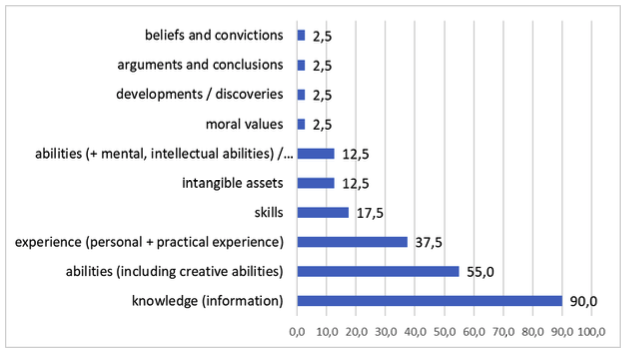
-----
Figure 2
Students’ opinions on the content of their own intellectual capital
(in % of the total number of respondents)
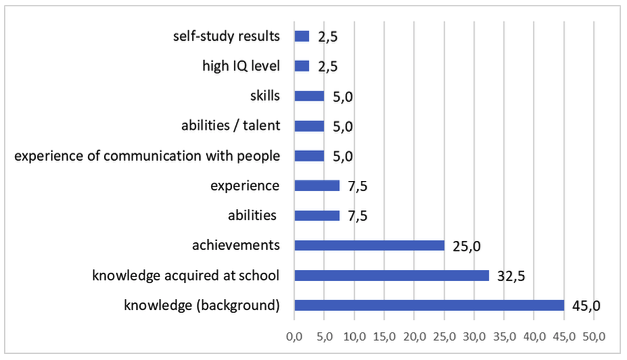
-----
Figure 3
Distribution of answers to the question on the evaluation of the students
own intellectual capital (in % of the total number of respondents
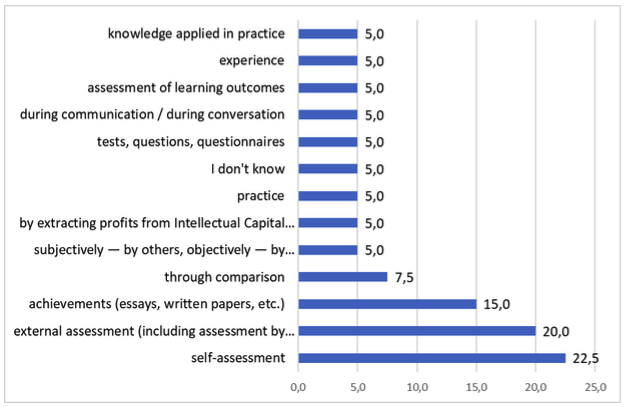
The students of each-year also gave interesting definitions of intellectual capital and presented their arguments as to the concept under consideration. Here are some definitions given by the students (cited verbatim):
The answers of the second-year students to the above questions are illustrated in Figures 4, 5 and 6.
Figure 4
Answers to the question: What is intellectual capital?
(in % of the total number of respondents)
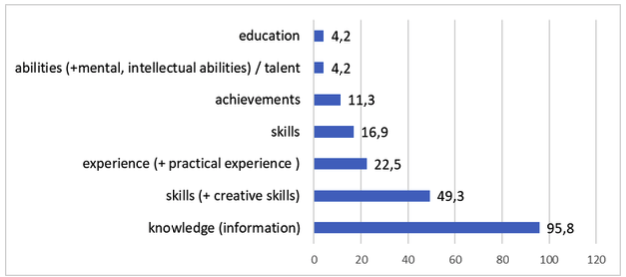
-----
Figure 5
Students’ opinions on the content of their own intellectual capital
(in % of the total number of respondents)
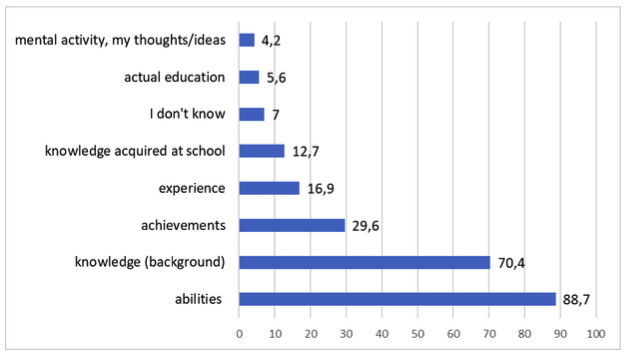
-----
Figure 6
Distribution of answers to the question on the evaluation of the students own intellectual capital
(in % of the total number of respondents)
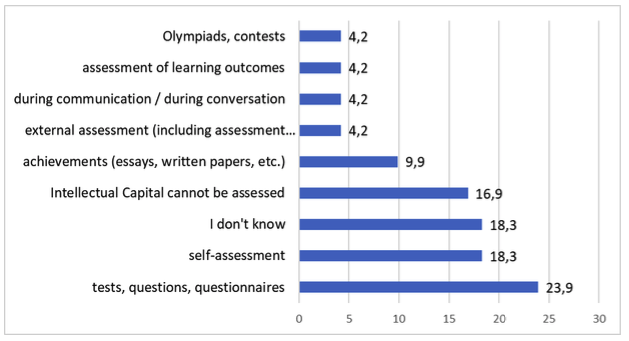
The definitions of the concept in question, which were written by second-year students, are as follow:
Results of survey of the third-year students are displayed on Figures 7, 8 and 9.
Figure 7
Answers to the question: What is intellectual capital?
(in % of the total number of respondents)
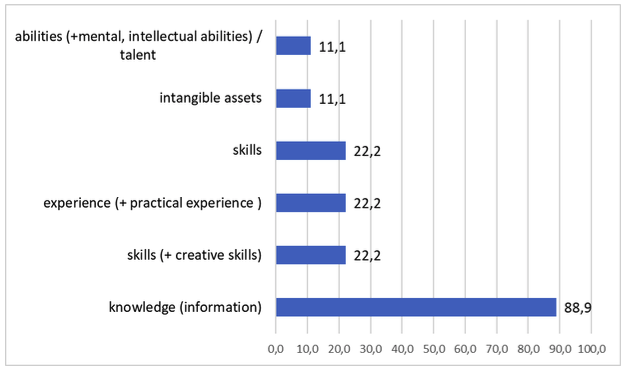
-----
Figure 8
Students’ opinions on the content of their own intellectual capital
(in % of the total number of respondents)
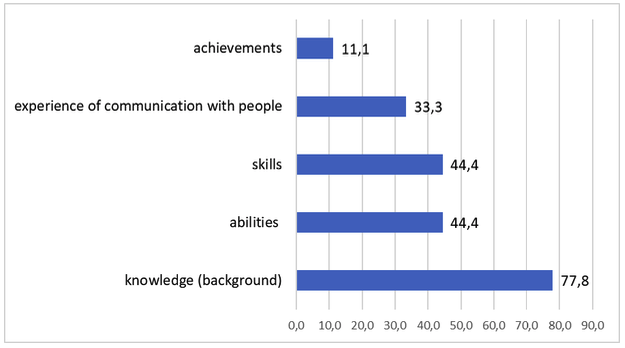
-----
The third-year students gave one author's definition of the concept of intellectual capital
Figure 9
Distribution of answers to the question on the evaluation of the students’
own intellectual capital (in % of the total number of respondents)
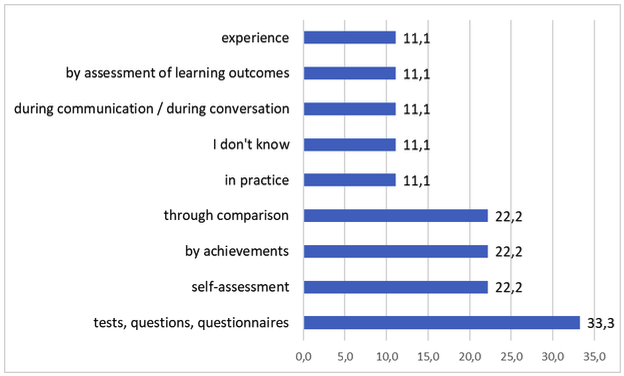
and expressed their opinion on the possibilities of assessment of intellectual capital:
The fourth-year students' opinions are presented in Figures 10, 11 and 12.
Figure 10
Answers to the question:
What is intellectual capital?
(in % of the total number of respondents)
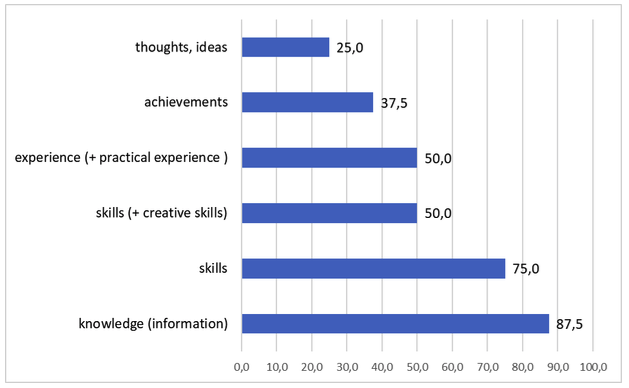
-----
Figure 11
Students’ opinions on the content
of their own intellectual capital
(in % of the total number of respondents)
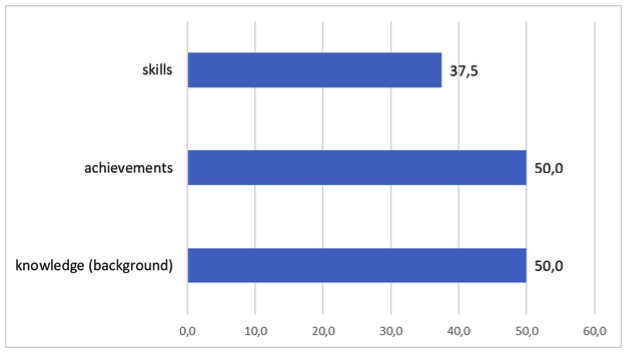
-----
Figure 12
Distribution of answers to the question on the evaluation
of the students’ own intellectual capital
(in % of the total number of respondents)
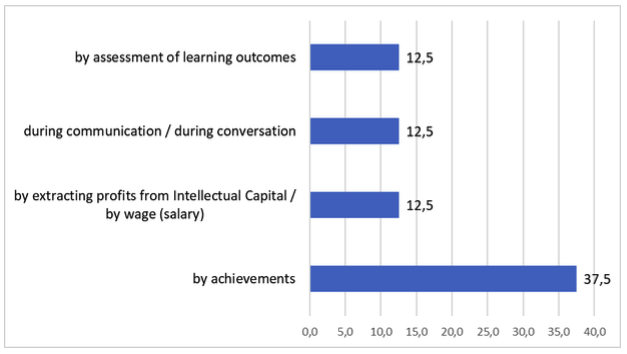
The fourth-year students simply enumerated what they understand by intellectual capital: this is mainly knowledge, skills, abilities and experience.
The overall results of the survey are presented in Figures 13, 14 and 15.
Figure 13
Answers to the question: What is intellectual capital?
(in % of the total number of respondents)

-----
Figure 14
Students’ opinions on the content of their own intellectual capital
(in % of the total number of respondents)
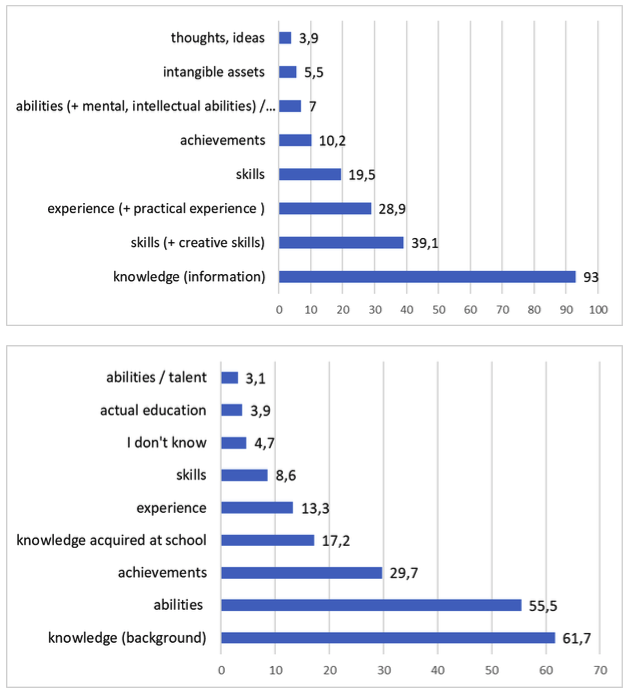
-----
Figure 15
Distribution of answers to the question on the evaluation
of the students’ own intellectual capital
(in % of the total number of respondents)
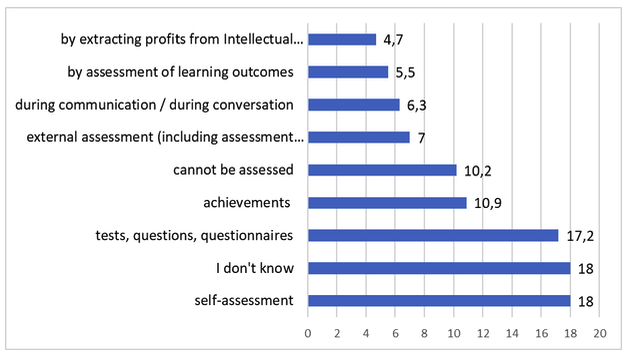
The analysis of the survey data shows that intellectual capital is basically understood as knowledge (93%), skills (39.1%) and experience (28.9%). Contemporary students believe that they possess some background gained earlier (61.7%), possess certain skills (55.5%) and have achievements in different areas (29.7%) — this is how they define the content of their intellectual capital. And it is suggested to evaluate intellectual capital by themselves (18% self-assessment), using tests, surveys (17.2%), as well as based on available human achievements (10.9%). However, 18% of respondents do not know how to evaluate intellectual capital, and 10.2% believe that it cannot be done at all.
By human achievements (the answer “achievements") the respondents understand: term papers, reports, participation in various university events (scientific seminar, round table, etc.), participation in scientific conferences, previous education (school, college, etc.), results of various types of training (e.g., basketball playing skills), learning materials (prepared essays, presentations, etc.), scientific articles, creative works, acquired skills (e.g., fencing, swimming, management skills, etc.), various certificates, credentials, diplomas and testimonials.
It is undeniable that a person acquires knowledge, skills and abilities in the process of learning or self-studying. To this end, the idea of modern education which is an integrated system that includes the production, preservation and translation of knowledge, as well as the upbringing and moral development of an individual becomes relevant. (Arapov, Arapova, 2018).
As a result of this research, the conclusion is obvious: each person has his or her own intellectual capital and each person understands in his or her own way what intellectual capital is (so many men, so many minds).
Arapov O.G., Arapova E.A., Volnyakova O.A., Solodukhin D.V. (2018). Filosofskie problemy obrazovaniya v russkoj estestvennonauchnoj mysli // Rossiyskiy tekhnologicheskiy zhurnal [Philosophical problems of education in the Russian natural scientific thought //Russian Technological Journal] 6 (6), 84-100. Available at: https://rtj.mirea.ru/upload/medialibrary/be7/RTZH_6_2018_84_100.pdf (in Russian). DOI: 10.32362/2500-316X-2018-6-6-84-100
Armstrong M. (2004). Praktika upravlenija chelovecheskimi resursami [Handbook of Human Resource Management Practice]. Sankt-Petersburg: Peter. (In Russian)
Brooking A. (2001). Intellektual'nyj kapital [Intellectual Capital: translation from English]. Edited by L.N. Kovalik. Sankt-Petersburg: Peter. (In Russian)
Bukowitz W., Williams R. (2002). Upravlenie znanijami: rukovodstvo k dejstviju [Knowledge Management Fieldbook] translation from English. Moscow: INFRA-M. (In Russian). Dresvyannikov V.A., Loseva O.V. (2017). Chelovecheskij intellektual'nyj kapital: teorija, metodologija i praktika ocenki: monografija [Human intellectual capital: theory, methodology and practice of evaluation: monograph]. Moscow: Rusayns. (In Russian)
Edvinsson L., Malone M. (1999). Intellektual'nyj kapital. Opredelenie istinnoj stoimosti kompanii [Intellectual Capital. Realizing Your Company's True Value by Finding Its Hidden Roots]. Novaja postindustrial'naja volna na Zapade. Antologija / Pod red. V.L. Inozemceva [New post-industrial wave in the West. Anthology. Edited by V.L. Inozemtsev]. Moscow: Academia, 429-447. (In Russian)
EHkonomicheskij slovar' (2017), [Economic Dictionary] Otv. ed. A.I. Arkhipov. Moscow: RG-Press. (In Russian)
Leontiev B.B. (2002). Cena intellekta. Intellektual'nyj kapital v rossijskom biznese [The price of intelligence. Intellectual capital in Russian business]. Moscow: Publishing Center "Aktsioner". (In Russian)
Loseva O.V. (2010). Otsenka stoimosti chelovecheskogo intellektual'nogo kapitala v organizatsii // Teoriya i praktika obshhestvennogo razvitiya [The estimation of value of human intellectual capital // The theory and practice of social development], 4, 271 – 273. (In Russian)
Nadtochiy Yu.B. (2017). Opredelenie sushhnosti i struktury intellektual'nogo kapitala vysshego uchebnogo zavedeniya // Konkurentosposobnost' v global'nom mire: ehkonomika, nauka, tekhnologii [Defining the essence and the structure of intellectual capital of a higher education institution // Competitiveness in the global world: economics, science, technologies], 10 (1), 66 – 69. (In Russian)
Stewart T.A. (2007). Intellektual'nyj kapital. Novyj istochnik bogatstva organizacij [Intellectual capital. The New Wealth of Organizations: translation from English]. Moscow: The Generation. (In Russian)
1. Candidate of Pedagogical Science, Associate Professor of the Department of Economics and Innovative Entrepreneurship, Faculty of Economics and Law, MIREA - Russian Technological University (RTU MIREA), Moscow, Russian Federation. yflnjxbq-7e@yandex.ru